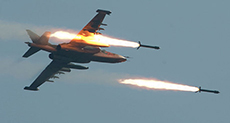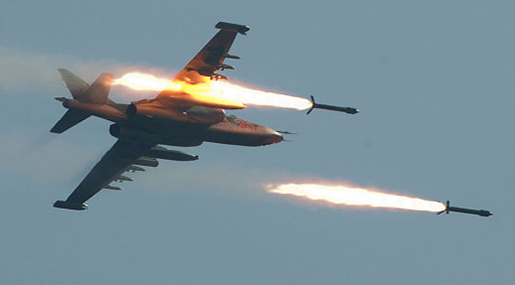How was the battle plan in Syria drawn up?

Ibrahim al-Amin
The militants fighting against the Syrian state vowed that its Russian ally will get stuck in a quagmire in the Levant. These [militants] recalled for the Russians the [experience] of Afghanistan, and said a new one awaited them. The issued threat was not limited to those militants, some of whom belonged to the generation who fought the Soviets in Kabul, or fought the Russian army in Chechnya and the Caucasus.

Rather, the idea of a quagmire was echoed by Western and Arab diplomats, and uttered by US President Barack Obama, who probably recalled what happened and what is happening with his country's army in Iraq and Afghanistan, or perhaps he was sending a signal to his allies in Syria, from militants to neighboring states, to justify not sending [US] soldiers to Syria out of fear of this quagmire.
It is natural for these warnings or estimates to be taken seriously. Not because those issuing them have interests on the ground [in Syria], nor due to the fact that the Russians have gone through harsh experiences.
Rather, because those who wish to send their soldiers abroad know well that the possibility [of a quagmire] is one of the real risks involved with such a move. It is just one of a large number [of risks] that were studied in depth since last May, at the level of the Russian and Iranian leaderships, before preceding the announcement of their alliance with Syria, Iraq and Hizbullah, to confront terrorism in Syria and Iraq. Yesterday, Putin settled the debate about the limits of Russian participation in the fighting in Syria. He said: "We will not enter the ground war no matter what happens, and our friends in Syria know this".
Some Necessary Clarifications:
Firstly: in the long and complex talks between the Iranian and Russian sides that lasted over four months, the Russians retained a margin of political action in parallel to strenuous work aimed at conceptualizing a rapid military intervention plan. This was linked to developments on the ground which indicated that the Syrian government requires qualitative and rapid support to prevent its enemies from achieving their goals. Russian efforts were not aimed at reaching a viable political solution in Syria, but rather, to avoid the option of direct military intervention in pursuit of a strategic decision to prevent the fall of the Syrian state.
Secondly: during discussions regarding the risks of military intervention, the Iranian side was clear regarding the fact that what was required was confined to two types of support: one relating to the sending of quality and new ammunition in large quantities to cover the needs of the Syrian army, the cost of which will be covered by Iran. The other relates to strengthening the air operations, a role that Russia is capable of playing due to many reasons, the most important of which is Moscow's ability to intervene without the need to take into account anyone in the world. Thus, Russia will not face any difficulties or disadvantages due to carrying out steps of this kind.
Thirdly: Iran made clear what the Syrian President Bashar al-Assad also made clear to the Russians, that ground forces are not required for carrying out extensive operations aimed at regaining control over many areas in Syria. A point that General Qassem Soleimani reiterated and put to rest in talks with the Russian president, by saying: ‘what is required of you is nothing other than to take charge of air operations, as for the ground operations, they are the responsibility of the allies'.
Fourth: The Russians did not hide their strong eagerness to carry out air operations and support ground operations aimed at eliminating all of the [militant] groups coming from the Caucasus. The [Russians] have decided, based on the operational plans, that this requires ground intelligence support, to be provided by the security operations room active on the ground in Syria, comprised of experts from Syria, the [Iranian] Revolutionary Guards, and Hezbollah. In addition, the [Russians] have also said that what is required is a clear decision on the need to regain control of all border areas with Turkey, and the closure of border crossings through which foreign fighters, especially those coming from the Caucasus, make their way to Syria.
In practice, what is happening today is a precise implementation of the set plan, something that Putin has pointed out more than once. Thus, those setting out the plans took into account Russian or global sensitivities towards the participation of Russian soldiers in the fighting on the ground. This while keeping in mind that Russian officers are taking part in the meetings within the ground operations rooms, which includes following-up on the ongoing ground operations. However, the aim of these plans is to remove as many dangers as possible.
Yet the Russians know that the issue is not limited to this aspect only, as they have placed their security, military, and intelligence apparatus on high alert ever since the start of the air operations. The main objective of these forces is to provide protection for Russian territory itself, including Russian cities and public facilities, where armed groups may appear in order to carry out terrorist acts in response to the Russian intervention in Syria. The announcement by the Russian Counter-Terrorism Committee yesterday that it foiled a terrorist act in Moscow and arrested those involved, was neither strange nor surprising.
More importantly, and something that some of Moscow's opponents seek to ignore, is that what pushed President Putin to take the decision to intervene [in Syria] is a set of reasons, the most prominent of which relates directly to the interests of Russia and its national security. Thus, the mechanisms for calculating the costs of this participation, both material and human, takes into account that the cost, no matter how great, cannot be compared to the cost associated with the strengthening and widening presence of terrorist groups, from Syria and Iraq to all of the south-west of Russia.
Putin is waging a battle today that relates directly to his country, and not [merely] related to his allies. Perhaps this is the difference with the United States, which has not convinced those working with it, from governments to regional nations, that it [really is] no longer able to afford the human and material consequences of its troops fighting outside its borders...this is the new development in the world!
Source: Al-Akhbar Newspaper, Translated and edited by website team
Comments




